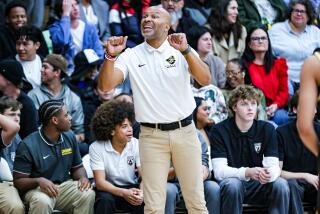Player Says Pressure Gets to Be Too Much : Youth basketball: Josh Oppenheimer remembers being a recruiting target at 14. And he isn’t happy about the decision he was drawn into making.
- Share via
Josh Oppenheimer survived a tumultuous basketball season.
The Northern Arizona Lumberjacks, members of the Big Sky Conference, lost their head coach, an assistant and three players in midseason. All said they left for personal reasons. End of story.
But Northern Arizona has not lost Oppenheimer, who transferred to the school at Flagstaff from the University of Rhode Island when his former coach there, Tom Penders, left to take the coaching job at Texas. Oppenheimer’s game started to jell in the high desert. He was not about to jeopardize his collegiate career because of a struggling program.
Not after the effort it took to become an NCAA Division I player.
Oppenheimer played so much youth basketball in Los Angeles that his face is known in most gyms. He can join Magic Johnson in a shoot-around or challenge Chris Mills and Sean Higgins to a pickup game.
So, when Oppenheimer discusses problems of summer league all-star traveling teams he knows whereof he speaks.
“You are now recruited three times if you are serious about playing when you are younger,” he said from Flagstaff. “When you’re in elementary school or junior high school, money is not worth a whole lot. So the coaches use anything they can, from taking you out to get you something to eat to giving you some tennis shoes . . . unlike college where people are talking about cars and payment and all that.”
Oppenheimer, who was a guard at Sherman Oaks Notre Dame High School, played for Benny Davenport of the Westside Blazers and Dave Benezra of the L.A. Rockfish. Those programs are considered two of the Southland’s best-coached.
That was not enough to stop Oppenheimer from defecting to an American Roundball Corp. all-star team as a ninth-grader. He recalls the situation with embarrassment, but said it embodies the essence of recruiting problems--lack of loyalty.
Oppenheimer said he was playing for the Rockfish when representatives from ARC asked him to join their team for a trip to Las Vegas.
“They were going to fly me out there and this and that came into effect,” he said. “I’m thinking, ‘This sounds like a great opportunity.’ ”
Something inside told Oppenheimer it was wrong to switch allegiances. But as a 14-year-old, he was too intimidated to broach the subject to his Rockfish coach.
“I felt so much pressure that they would be mad at me,” he said. “I thought if I just kept my mouth shut and went, everything would be fine when I came back.”
When Oppenheimer returned, Benezra already had heard about his young player competing in the ninth-grade national tournament sponsored by Nike. He was upset, but only because Oppenheimer had failed to tell him.
Oppenheimer, who was the team’s eighth man at the time, was demoted because, he was told, he was disloyal.
“It was probably the biggest mistake I made in high school,” he said. “Never again, no matter how good the opportunity sounded, was I going to leave that team. I feel like I betrayed my teammates and it was a terrible feeling.”
Oppenheimer was not the first to have the strings of loyalty tugged. Nor will he be the last.
Veterans of Southland basketball say such recruiting is intrinsic to the game.
“You’re being recruited every weekend you play,” Oppenheimer said. “Every time you see a coach, he is trying to get you to jump from one team to another. Whether it’s a Chris Mills or somebody else, everybody at one time or another is propositioned to leave their team. As a young player, you start to feel tons of pressure.”
Oppenheimer said the Rockfish players would joke about the enticing telephone calls they received.
“We’d say at practice, ‘So-and-so called and told me I wouldn’t have to pay a cent to go on a trip, that I’d get keys to the van and have a free hotel, free this and free that . . . everything is paid for.’
“Players who know what really matters, those things don’t mean a thing to them.”
The Rockfish were a special group--11 of the 12 players received NCAA Division I scholarships. Some of the outstanding players were Scott Williams, now at North Carolina, Earl Duncan at Rutgers, Derek Strong at Xavier and Jason Matthews at Pittsburgh.
Players have an unwritten rule to not discuss recruiting with outsiders. Although many have seen friends hurt by unscrupulous coaches and middlemen, they are reticent to expose the system.
J.D. Green, who transferred to Cal State Fullerton from Southern Methodist, was typical. “I know that it does happen,” he said. “But I’m going to choose not the mention them.”
Green, who played at Fairfax High School with Mills and Higgins, said good young players are helped because some adults want to control their college recruiting years later.
“My parents always told me nobody will give you something for nothing,” he said.
From the players’ perspective, that seems to be worth remembering.
More to Read
Go beyond the scoreboard
Get the latest on L.A.'s teams in the daily Sports Report newsletter.
You may occasionally receive promotional content from the Los Angeles Times.










